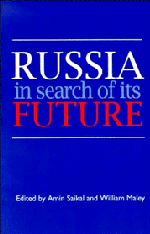Book contents
- Frontmatter
- Contents
- Preface
- Notes on Transliteration
- 1 Introduction
- Politics
- Economics
- International Relations
- Culture and Society
- 10 Culture in Russia and Russian Culture
- 11 Reconstruction, Deconstruction and the Restoration of Literature in Russia
- 12 Alternative Visions of the Russian Future
- Conclusion
- Notes on contributors
- Index
11 - Reconstruction, Deconstruction and the Restoration of Literature in Russia
Published online by Cambridge University Press: 03 May 2011
- Frontmatter
- Contents
- Preface
- Notes on Transliteration
- 1 Introduction
- Politics
- Economics
- International Relations
- Culture and Society
- 10 Culture in Russia and Russian Culture
- 11 Reconstruction, Deconstruction and the Restoration of Literature in Russia
- 12 Alternative Visions of the Russian Future
- Conclusion
- Notes on contributors
- Index
Summary
In an article which appeared in the first 1993 edition of Literaturnaia gazeta, Chuprinin confidently asserts that ‘at long last we have a normal literature’. The suggestion here is that the disintegration of the Soviet Union, the end of bipolar confrontation and the decisive move towards democratic pluralism and a market economy have eliminated the narrow discursive boundaries of Soviet literary culture and signalled the assumption of Western ‘universal’ values. These developments have, in turn, permitted Russian literature to ‘catch up’ to and develop alongside ‘normal’ European/North American culture. For its part, the West, to which Chuprinin purports Russian literature now belongs, would baulk at the exclusivity implied in this observation. By invoking the universal of ‘normality’, Chuprinin's remark implies a hierarchy of evaluative norms which is considered immensely unfashionable, not to say meaningless, in the post-structuralist critical discourse of the West. Chuprinin's remark does, nonetheless, imply some interesting tendencies in post-Soviet Russian literature and criticism which could be productively examined from the perspective of postmodernity. Foremost among these is the provocation of the binary opposition Russia/Europe, along with its culturological synonyms populism/postmodernism, art for politics/art for art, incomplete culture/complete culture.
Social and intellectual historians of Russia have fondly attributed a recurring dualism to this opposition, more often than not in terms of the recurring Slavophile/Westerniser debate.
- Type
- Chapter
- Information
- Russia in Search of its Future , pp. 178 - 189Publisher: Cambridge University PressPrint publication year: 1994



